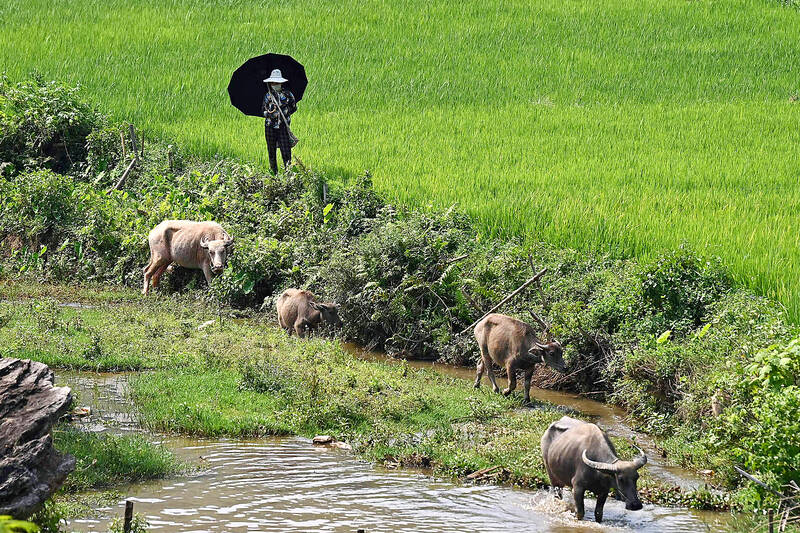More than 100 temperature records last month fell across Vietnam, official data showed, as a deadly heat wave scorches South and Southeast Asia.
Extreme heat has blasted Asia from India to the Philippines in the past few weeks, triggering heatstroke deaths, school closures and desperate prayers for cooling rain.
Scientists have long warned that human-induced climate change would produce more frequent, longer and intense heat waves.

Photo: AFP
Last month, Vietnam endured three waves of high temperatures, National Center for Hydro-Meteorological Forecasting data published on Friday showed, with the mercury peaking at 44°C in two towns earlier this week.
The mark is only slightly below the highest temperature ever recorded in Vietnam — 44.2°C on May 7 last year.
In all, 102 weather stations reported record highs last month, as northern and central Vietnam bore the brunt of the heat wave, with temperatures on average 2°C to 4°C higher than during the same period last year.
Seven stations on Tuesday recorded temperatures above 43°C.
The most dramatic sign of the extreme weather hitting Vietnam came in the southern province of Dong Nai, where hundreds of thousands of fish died in a reservoir.
Images showed locals wading and boating through the 300-hectare Song May reservoir, with the water barely visible beneath a blanket of dead fish.
The mass die-off was blamed on water shortages caused by the heat wave and poor management.
The Vietnamese weather agency is predicting more hot weather this month, with temperatures expected to be 1.5°C to 2.5°C higher than in previous years.
While April and May are normally the hottest time of year in Southeast Asia, experts say the El Nino effect is making this year’s heat particularly intense.
Heat records were also broken in Bangladesh and Myanmar last month, while heatstroke has killed at least 30 people in Thailand since the start of the year and high temperatures were partly blamed for a deadly explosion at a Cambodian ammunition dump.
Roman Catholic bishops in the Philippines are urging the faithful to pray for rain and lower temperatures, after the heat forced the government to close tens of thousands of schools.
The Indian megacity of Kolkata has sweltered through punishing heat, peaking at 43°C for the city’s hottest single April day since 1954.

SECURITY: As China is ‘reshaping’ Hong Kong’s population, Taiwan must raise the eligibility threshold for applications from Hong Kongers, Chiu Chui-cheng said When Hong Kong and Macau citizens apply for residency in Taiwan, it would be under a new category that includes a “national security observation period,” Mainland Affairs Council (MAC) Minister Chiu Chui-cheng (邱垂正) said yesterday. President William Lai (賴清德) on March 13 announced 17 strategies to counter China’s aggression toward Taiwan, including incorporating national security considerations into the review process for residency applications from Hong Kong and Macau citizens. The situation in Hong Kong is constantly changing, Chiu said to media yesterday on the sidelines of the Taipei Technology Run hosted by the Taipei Neihu Technology Park Development Association. With

CARROT AND STICK: While unrelenting in its military threats, China attracted nearly 40,000 Taiwanese to over 400 business events last year Nearly 40,000 Taiwanese last year joined industry events in China, such as conferences and trade fairs, supported by the Chinese government, a study showed yesterday, as Beijing ramps up a charm offensive toward Taipei alongside military pressure. China has long taken a carrot-and-stick approach to Taiwan, threatening it with the prospect of military action while reaching out to those it believes are amenable to Beijing’s point of view. Taiwanese security officials are wary of what they see as Beijing’s influence campaigns to sway public opinion after Taipei and Beijing gradually resumed travel links halted by the COVID-19 pandemic, but the scale of

A US Marine Corps regiment equipped with Naval Strike Missiles (NSM) is set to participate in the upcoming Balikatan 25 exercise in the Luzon Strait, marking the system’s first-ever deployment in the Philippines. US and Philippine officials have separately confirmed that the Navy Marine Expeditionary Ship Interdiction System (NMESIS) — the mobile launch platform for the Naval Strike Missile — would take part in the joint exercise. The missiles are being deployed to “a strategic first island chain chokepoint” in the waters between Taiwan proper and the Philippines, US-based Naval News reported. “The Luzon Strait and Bashi Channel represent a critical access

Pope Francis is be laid to rest on Saturday after lying in state for three days in St Peter’s Basilica, where the faithful are expected to flock to pay their respects to history’s first Latin American pontiff. The cardinals met yesterday in the Vatican’s synod hall to chart the next steps before a conclave begins to choose Francis’ successor, as condolences poured in from around the world. According to current norms, the conclave must begin between May 5 and 10. The cardinals set the funeral for Saturday at 10am in St Peter’s Square, to be celebrated by the dean of the College